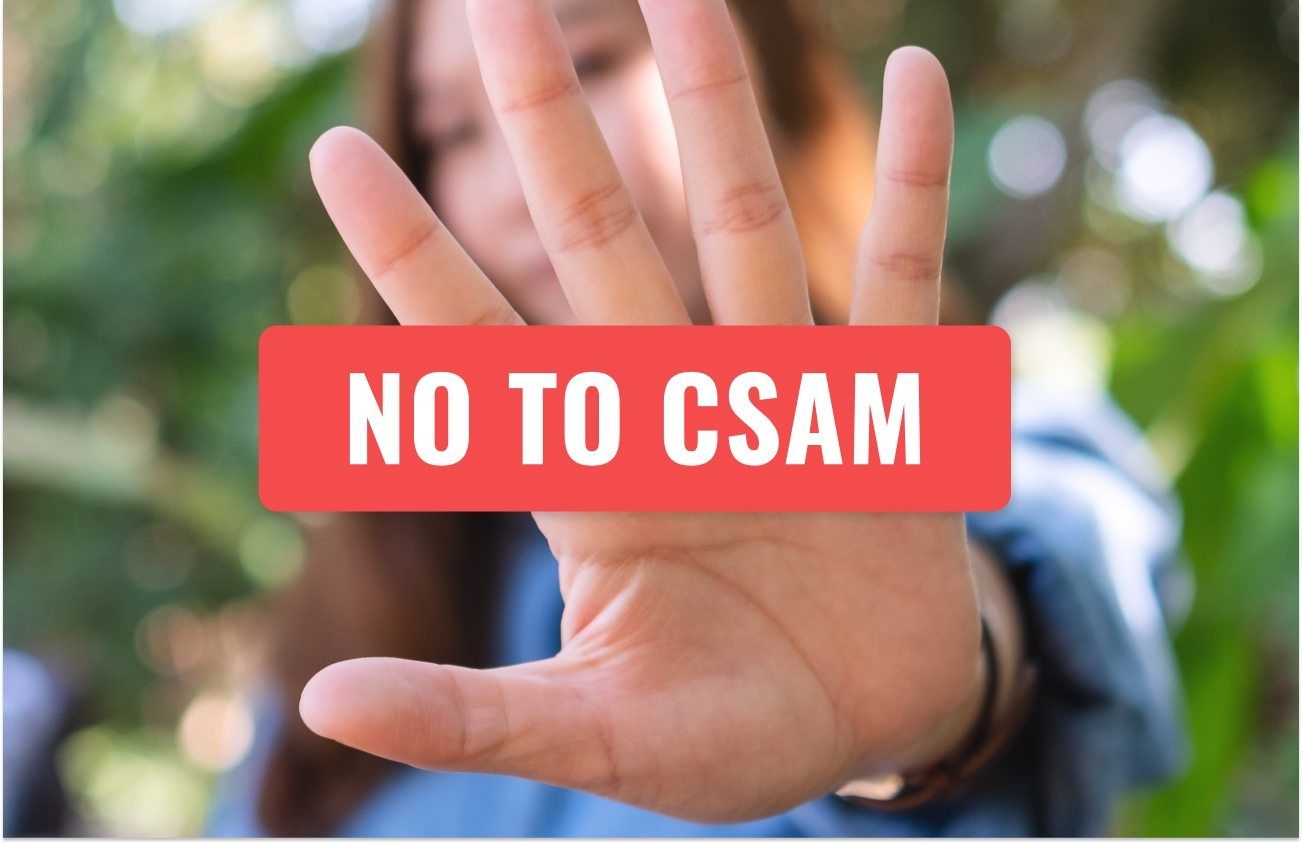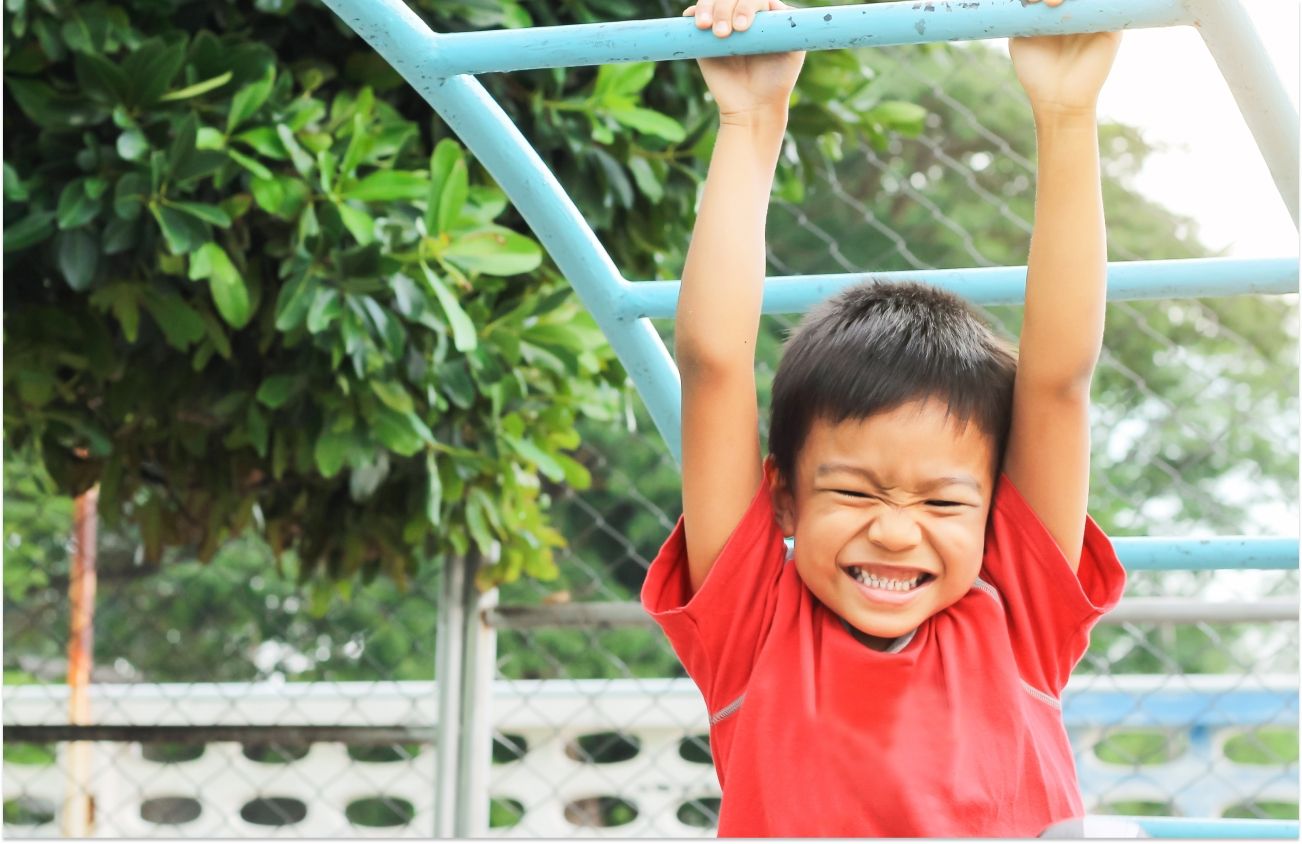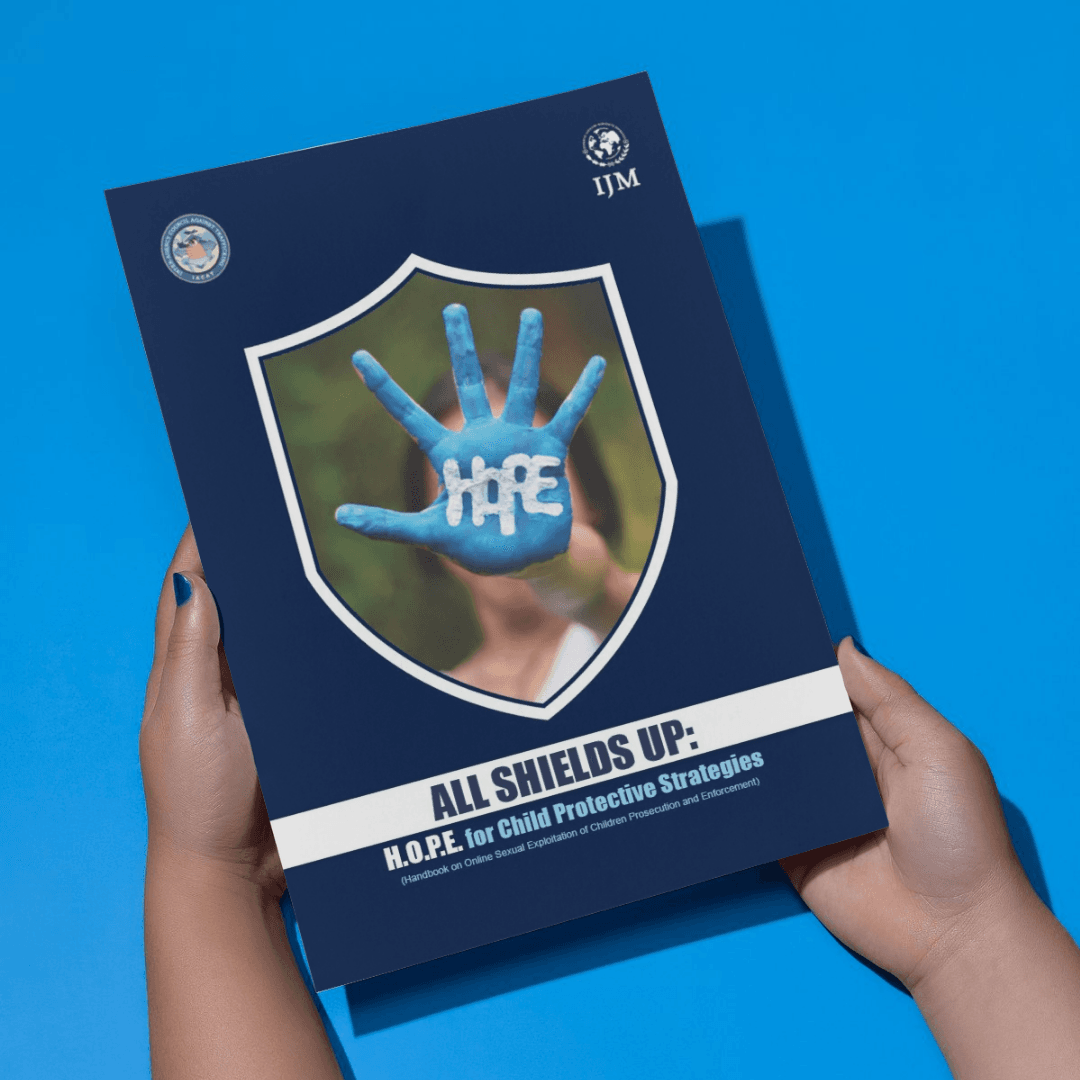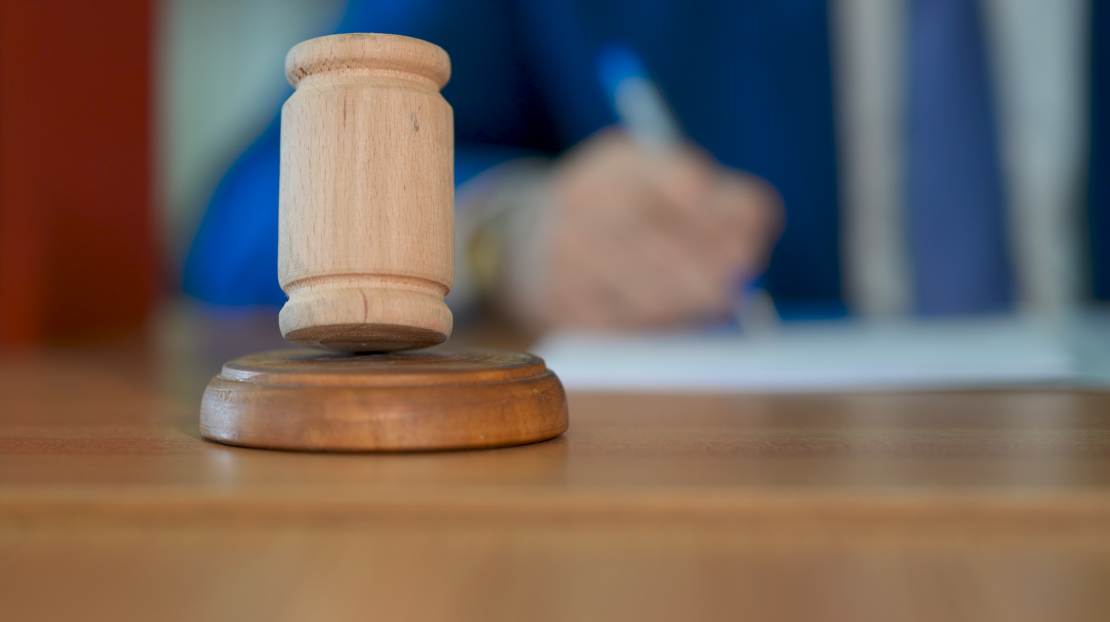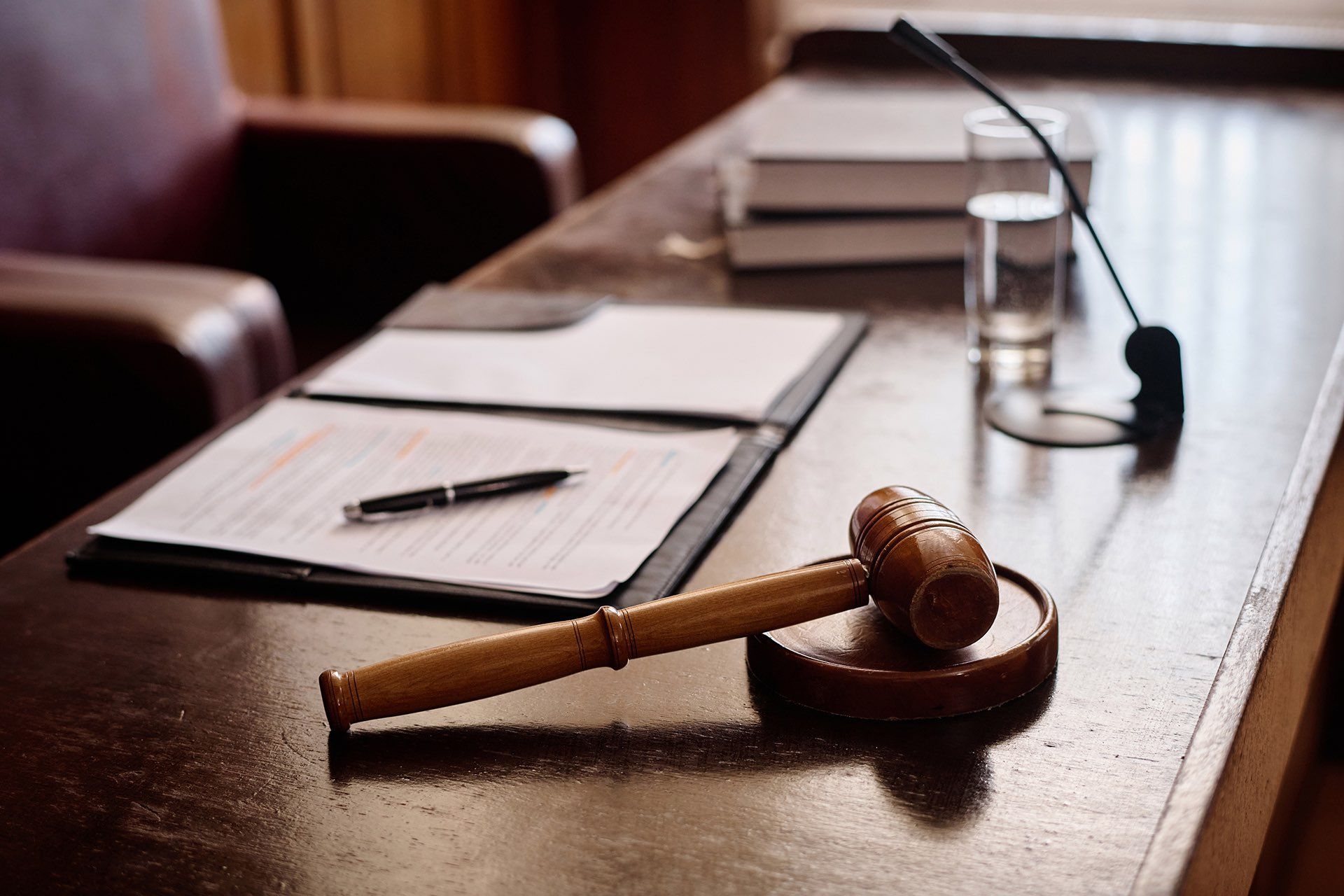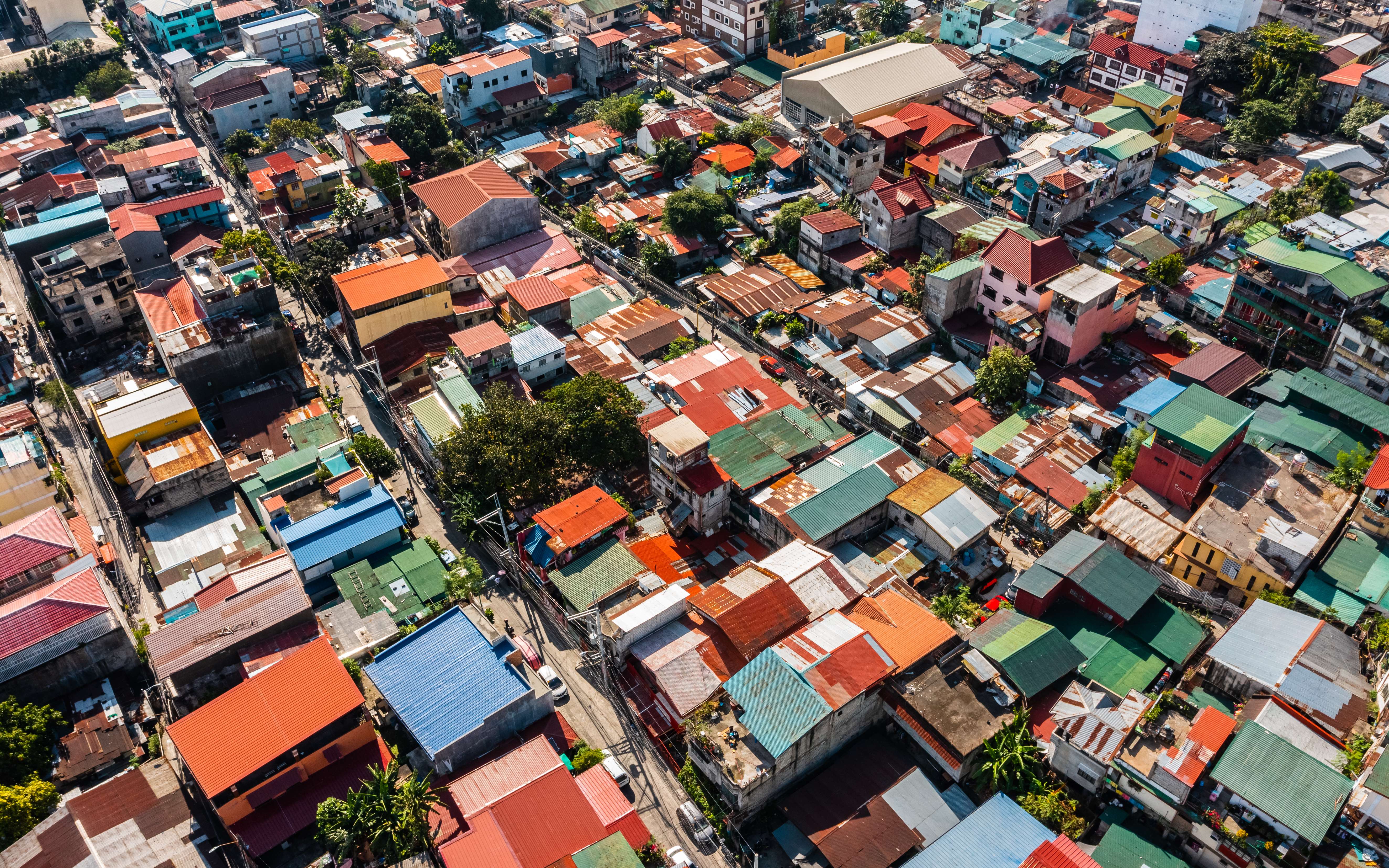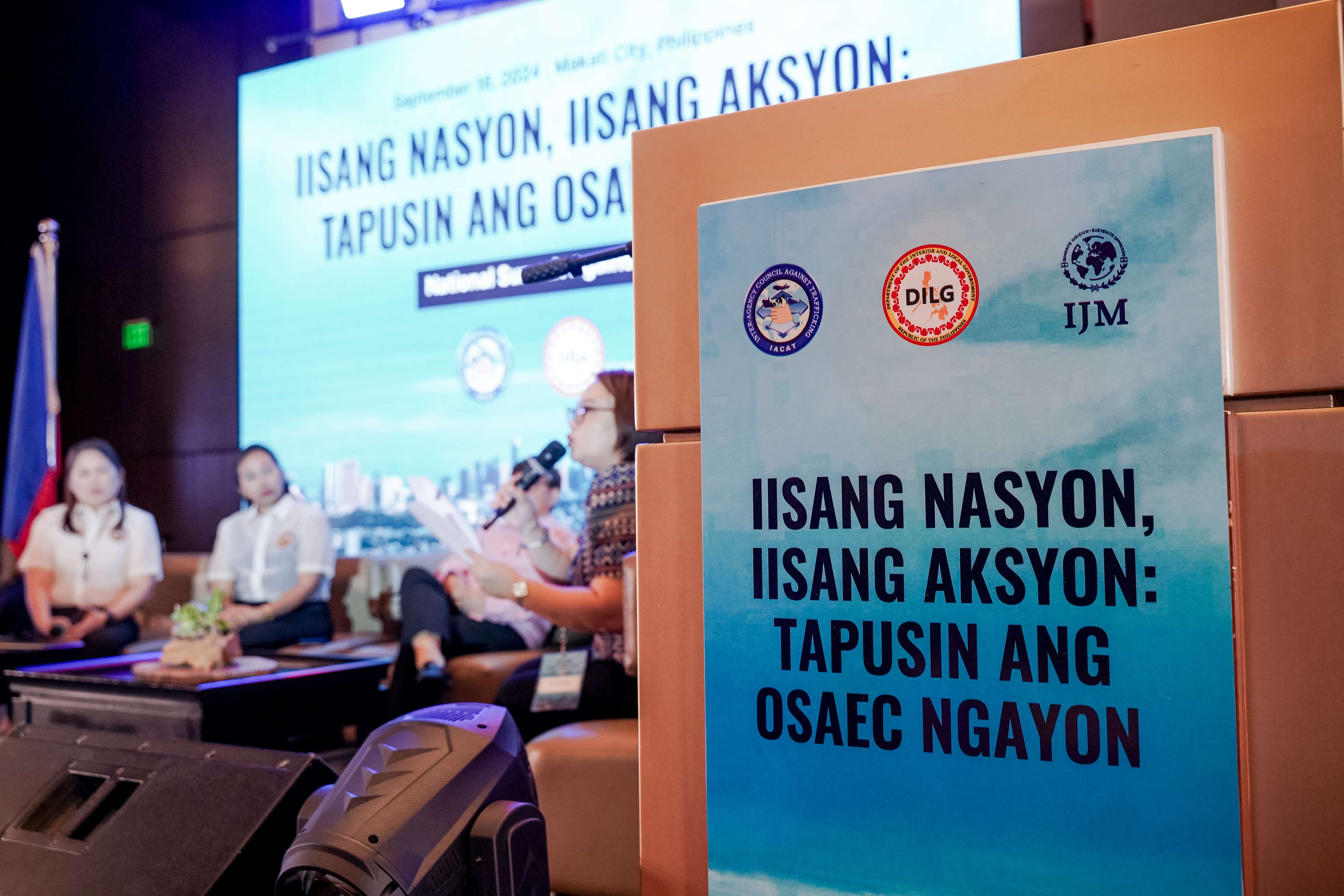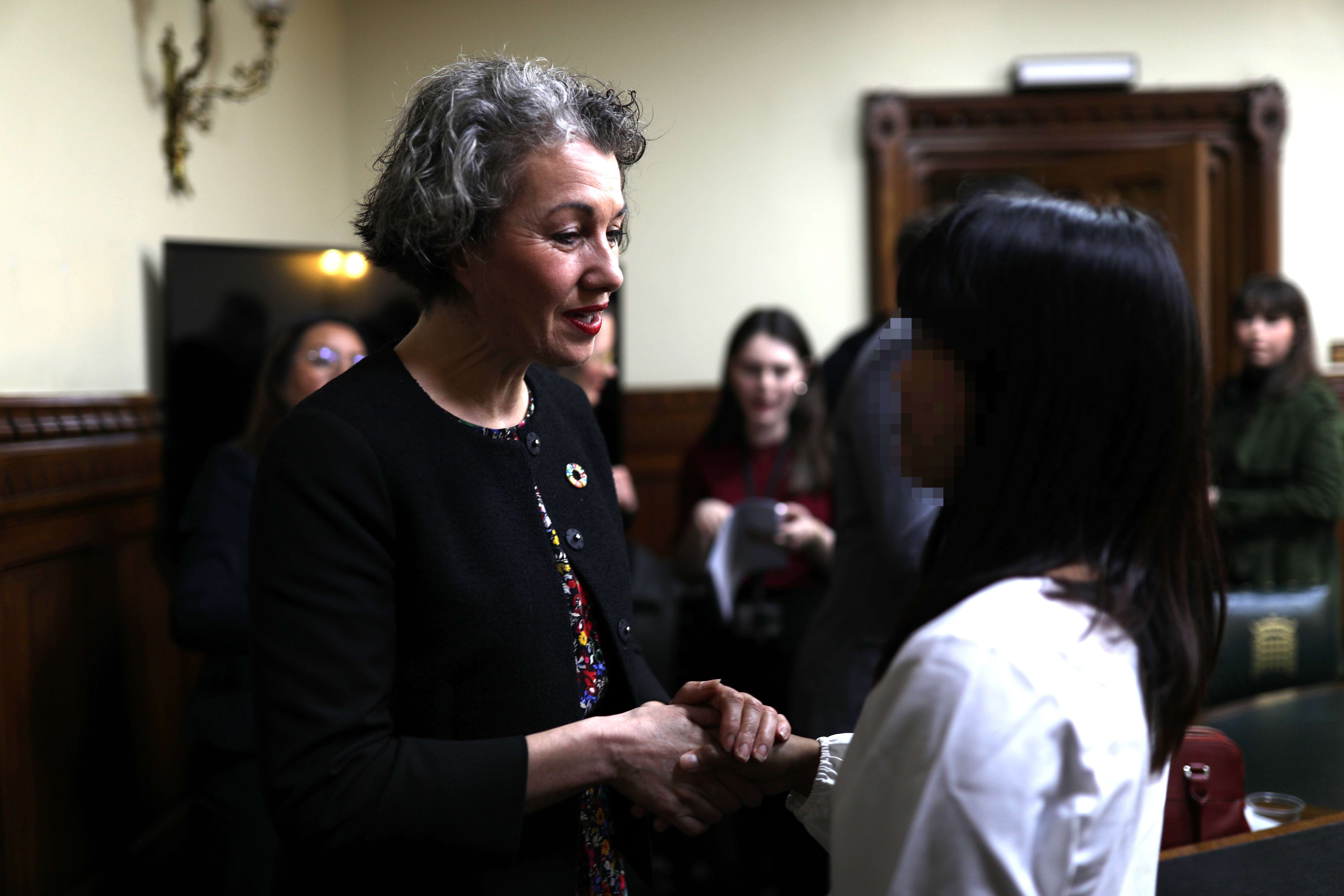
Livestreaming of child abuse happens on mainstream online platforms, allowing offenders from anywhere in the world to direct the acts of abuse done on children, in real-time. The difficult truth is that companies are failing to detect and report or prevent these live crime scenes on their platforms, as the UK Telegraph reports:
Yet despite the threat it poses, the crime of live-streamed child sexual abuse – produced overseas, but consumed here in the West – remains overlooked, crowded out by concern and focus on what can be done to better protect our own children against online predation, not the children of others.
A survivor Cassie* of this type of abuse and became a founding member of the Philippine Survivor Network, speaks before the UK government in a recent round table discussion.
On March 12, 2024, Sarah Champion Member of Parliament (MP) and International Justice Mission (IJM) UK hosted this deliberation on how the UK can do more to tackle this serious global crime.
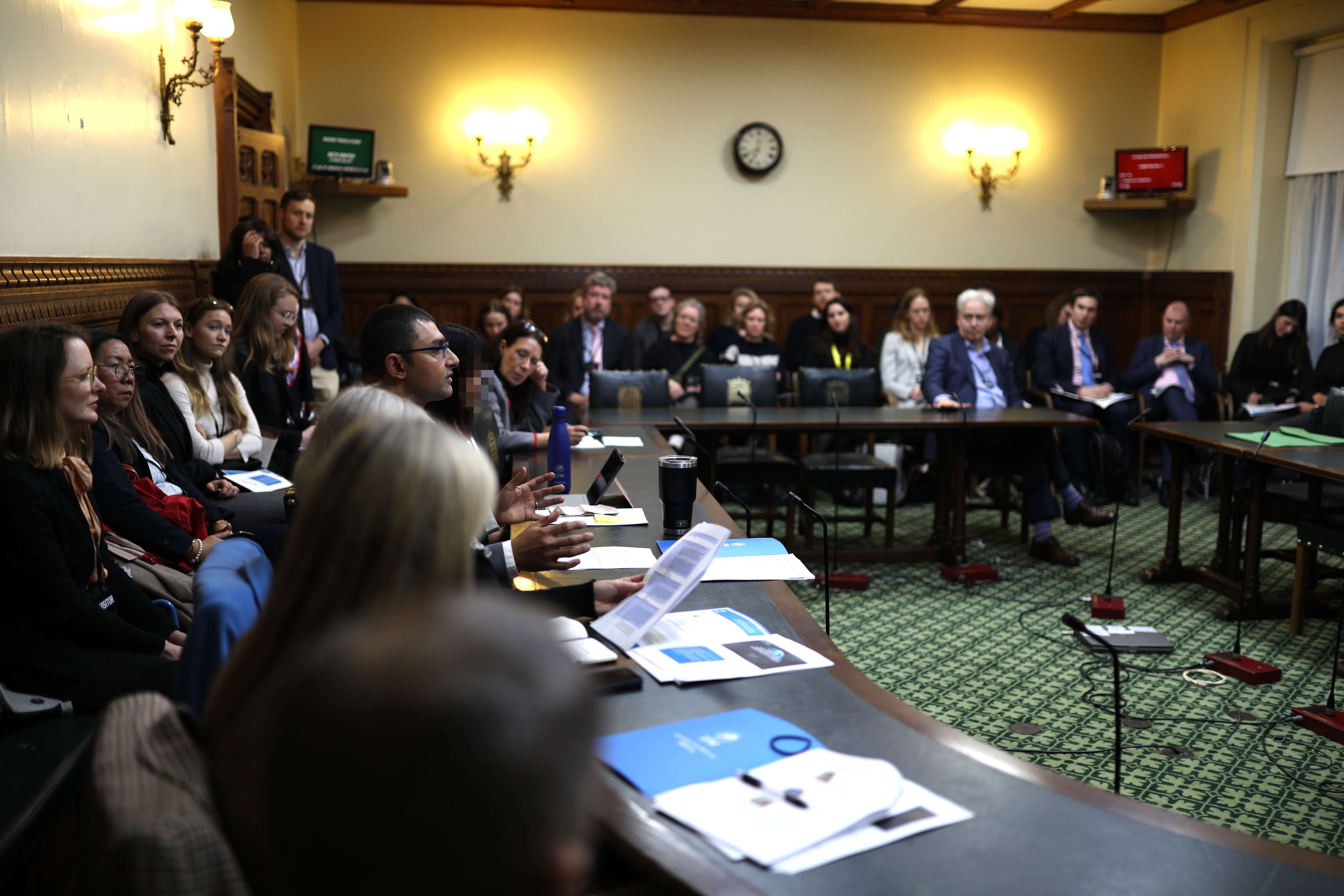 The Parliamentary round table participants. Cassie’s face was blurred to protect her identity.
The Parliamentary round table participants. Cassie’s face was blurred to protect her identity.
Cassie and John Tanagho of IJM’s Center to End Online Sexual Exploitation of Children, a IJM team scaling the fight against this crime globally, were among the panelists who contributed to discussions:
-
Dame Sara Thornton, DBE QPM, Professor of Modern Slavery Policy, Rights Lab, University of Nottingham, Former Independent Anti-Slavery Commissioner
-
Cassie*, Leader at the Philippines Survivor Network and advisor to IJM
-
John Tanagho, Executive Director of IJM’s Center to End Online Sexual Exploitation of Children
-
Sharon Pursey OBE, Co-Founder of SafetoNet.
-
Michael Tunks, Head of Policy and Public Affairs at Internet Watch Foundation (IWF)
-
Wendy Hart, UK National Crime Agency (NCA) Deputy Director CSA
-
Christian Papaleontiou, Deputy Director, Tackling Child Sexual Abuse Unit, Home Office
-
Sarah Blight, Online Safety Principal at Ofcom
The estimated prevalence behind this heinous crime
In partnership with the University of Nottingham Rights Lab, a world-leading human trafficking research institution, IJM launched Scale of Harm to estimate the prevalence of trafficking of children to produce new child sexual exploitation material (CSEM), including via livestreaming, in the Philippines. It revealed that nearly half a million Filipino children were trafficked to produce new child sexual exploitation materials in 2022 alone. That’s approximately 1 in every 100 children being sexually abused via live video streams.
This crime is fueled by demand, commonly offenders from the Western side of the world, and with Britain identified one of the top proliferators.
Found to be the ‘third largest global consumer of livestreamed abuse’, according to the UK National Crime Agency (NCA):
Offenders in the UK are causing and inciting the sexual abuse of children in places like the Philippines live online, paying as little as £15 to dictate what happens to the child in real time, facilitated by a local trafficker. These acts can include rape, sexual violence and, in extreme cases, bestiality.
UK NCA, as cited by the Telegraph
The Anti-Money Laundering Council (AMLC) similarly identified the UK as the ‘second highest worldwide sender of suspicious transactions related to online sex abuse, behind the US.’
Between 2020 and 2022, more than 180,000 suspicious transactions sent to the Philippines, totalling £22.1 million, were identified by the Anti-Money Laundering Council. This marks a stark jump from 2018, when just 606 STRs were recorded.
AMLC, as cited by the Telegraph
These findings highlight the need for accelerated action, not just in the Philippines but also in demand-side countries like the UK, to combat the trafficking of children for livestreamed child sexual abuse and CSEM production.
Survivor advocate at the frontlines
Cassie* was trafficked at the age of 12 and abused via livestream for five years. She is an empowered survivor advocate and leads a coalition of survivors of child sexual abuse, commercial sexual exploitation, and online sexual exploitation of children in the Philippines.
As a panelist in the round table, she contributed valued insights through her lived experience, and emphasized the gravity of this crime:
As we sit here today, there are men in this country who are paying for children to be abused for them to watch live online. They are watching them be stripped of their dignity and abused for their own satisfaction- just like they watched me.
The internet has no borders – and neither does this crime.
Cassie, a founding member of the Philippines Survivor Network
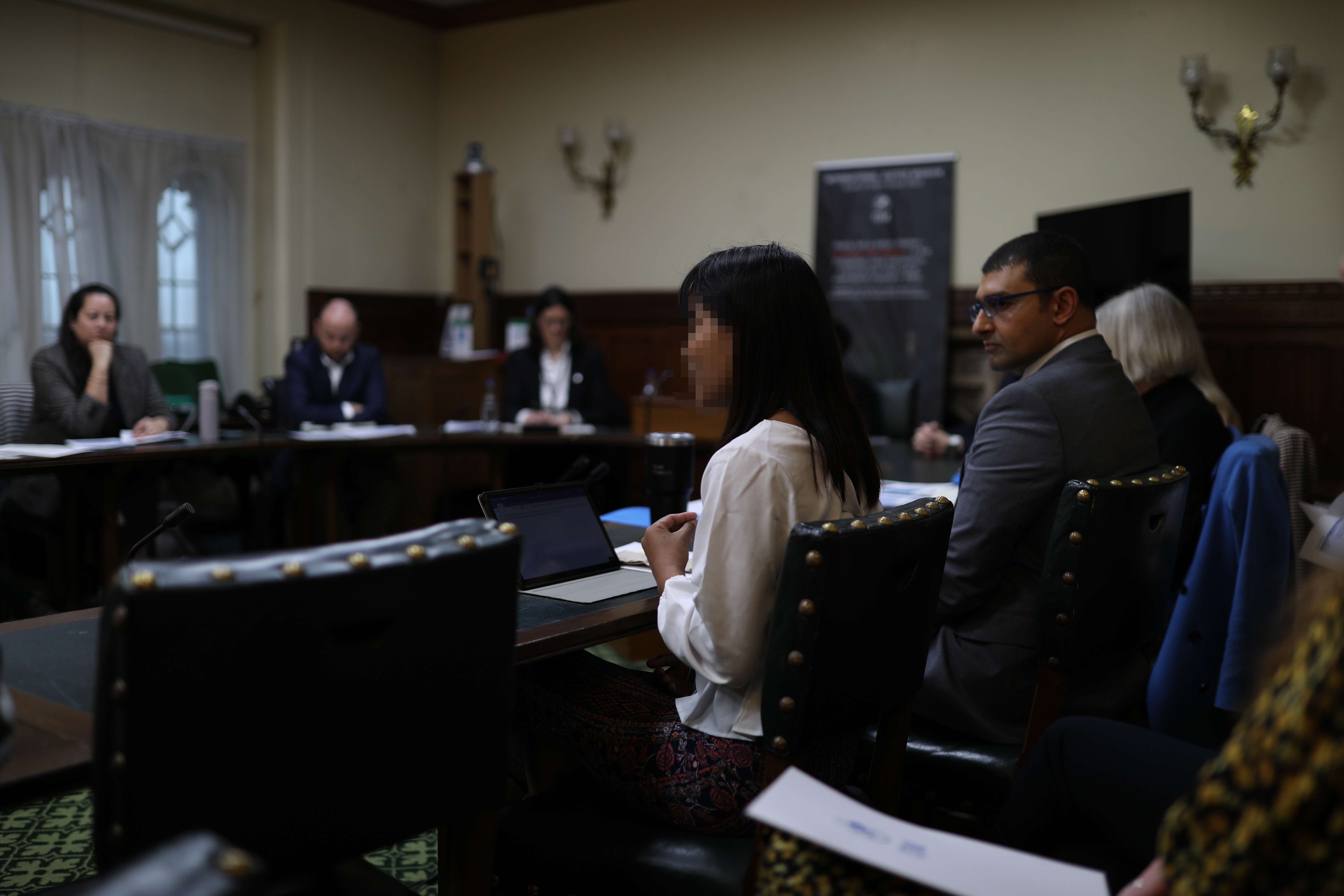 Cassie peaking before the Parliamentary round table participants. Cassie’s face was blurred to protect her identity.
Cassie peaking before the Parliamentary round table participants. Cassie’s face was blurred to protect her identity.
The urgency to respond to this crime
All panelists called for strengthened and immediate action to address this heinous crime against children, specifically towards its detection and reporting.
They called for Ofcom, UK’s online safety regulator, to ensure robust implementation of the Online Safety Act, requiring tech companies to prevent, disrupt, and/or report livestreamed child sexual abuse.
IJM’s John Tanagho explained that:
Whilst there are systems in place to detect existing child sexual abuse images and videos, tech companies are largely not detecting livestreamed abuse. This means that a sex offender is more likely to be caught and prosecuted if they download existing child abuse materials than if they pay for a child to be abused in real-time via livestream for them to watch from the comfort of their home. Livestreamed abuse urgently needs to be detected.
Pioneering safety-tech company based in the UK, SafeToNet, also demonstrated its new AI-taught on-device detection software ‘HarmBlock’ which could allow child abuse to be detected and blocked. Sharon Pursey OBE, co-founder of SafeToNet said:
As leaders in child protection, we’re confident that our HarmBlock technology is the breakthrough solution. Integrated seamlessly into device operating systems, it detects and blocks illegal sexual content instantly. Whether it’s consumption, creation, or distribution, HarmBlock serves as the ultimate defense. Compatible with smartphones, tablets, and laptops, it creates a universal safety standard for the internet.
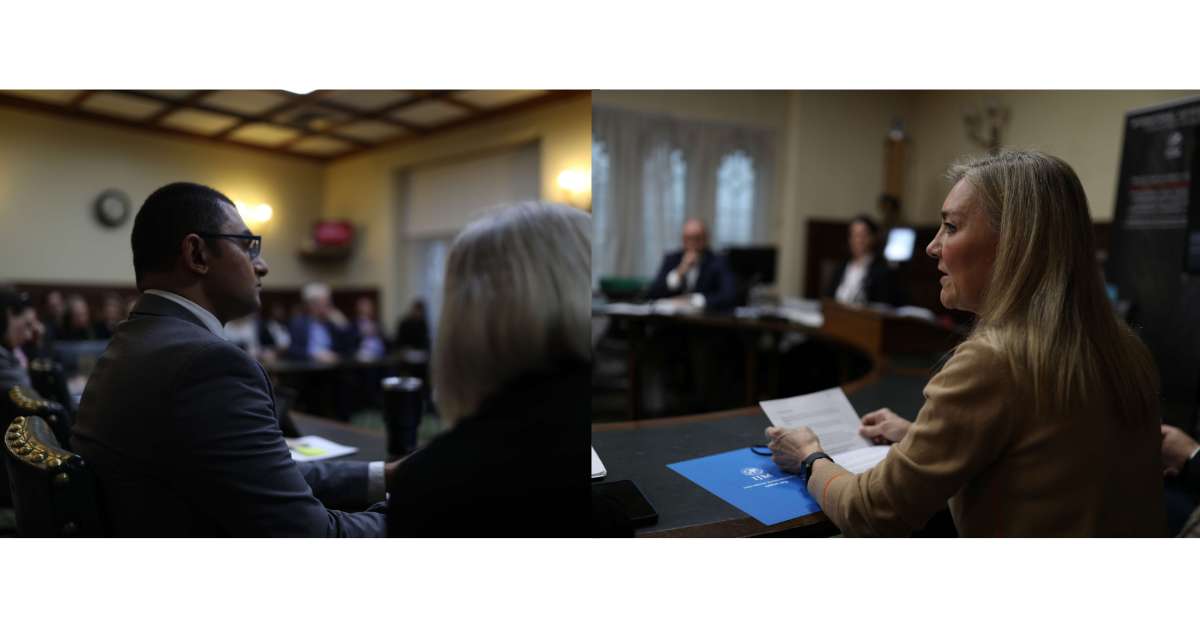 Left: Panelist John Tanagho, Executive Director of IJM’s Center to End Online Sexual Exploitation of Children; Right: Panelist Sharon Pursey OBE, Co-Founder of SafeToNet
Left: Panelist John Tanagho, Executive Director of IJM’s Center to End Online Sexual Exploitation of Children; Right: Panelist Sharon Pursey OBE, Co-Founder of SafeToNet
Ofcom likewise responded to the calls of the panel, alongside the UK Home Office. Both provided insights on their actions to address this abuse as well.
This is a system wide problem that requires a system wide response and we see ourselves at Ofcom as very much part of that system and want to encourage the creation of solutions to tackle this hideous crime.
Campaigners who contributed to the round table discussions also urged UK authorities to ensure that demand-side offenders who pay for and direct livestreamed sexual abuse are prosecuted using strong charges and receive prison sentences commensurate to the gravity of their harm, and that foreign victims receive compensation.
U.K. Parliament responds, calling for swift action
The panel was acknowledged and responded to by Sarah Champion MP. She urged immediate action by all to do more. Calls were made for swift action by tech companies, financial institutions, regulators, and law enforcement to urgently improve prevention, detection and reporting of the livestreamed sexual abuse that is causing serious harm to children around the world:
The disgusting crime of livestreamed child abuse is rising exponentially. It’s critical that action is taken now – tech companies, financial institutions and law enforcement all need to do more to proactively prevent and detect this abuse and protect children.
The police simply don’t have the capacity to address this horrendous crime which means across the planet vulnerable hundreds of thousands of children are being horrifically exploited. We cannot allow this to continue.
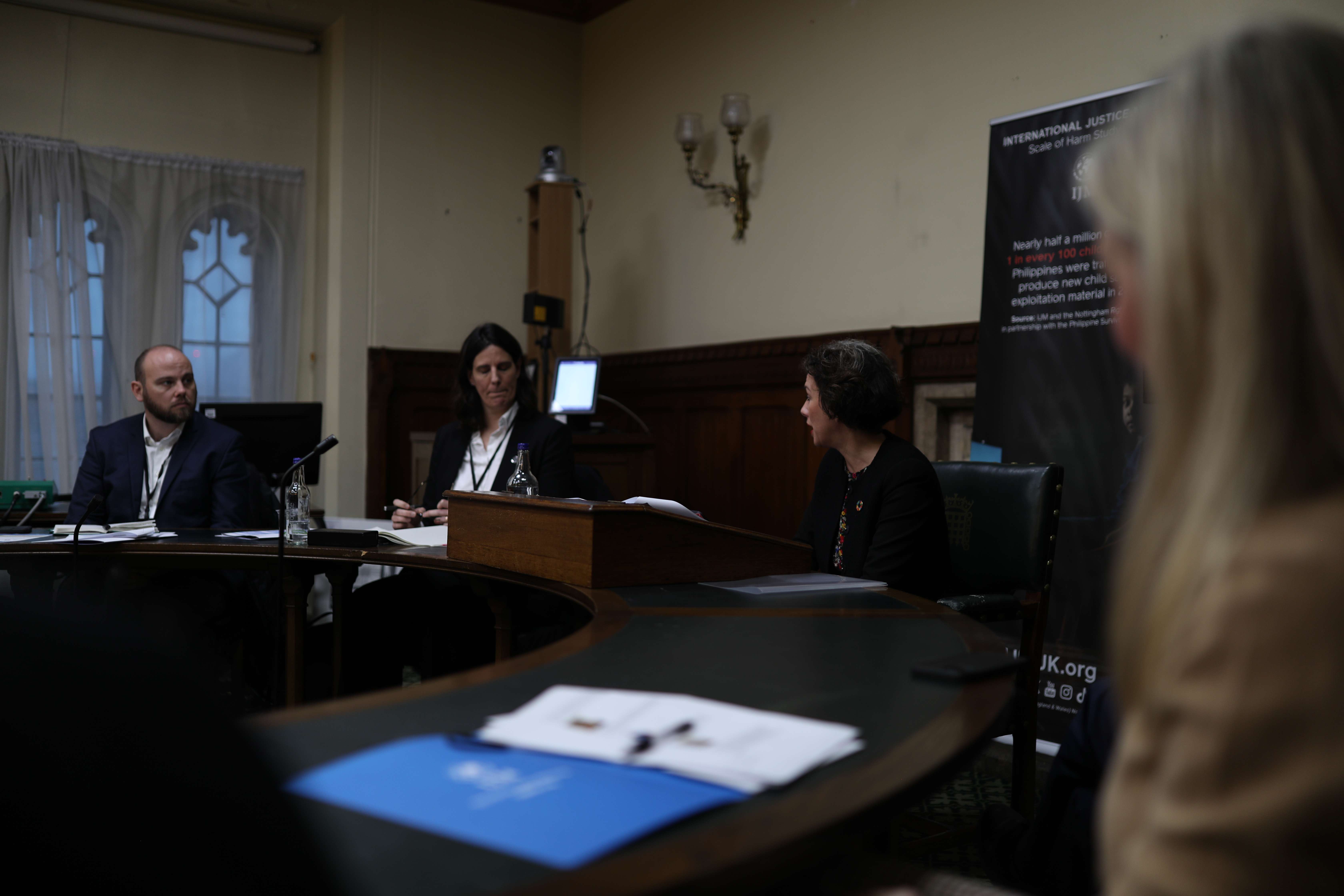 Sarah Champion MP (rightmost) speaking to some members of Parliament.
Sarah Champion MP (rightmost) speaking to some members of Parliament.
Legislators in global governments to champion survivor voice and advocacy
From the list of recommendations by IJM’s Scale of Harm study, one was ‘demand-side governments should urgently pass online safety legislation with survivor consultation.’ Much like this roundtable format, legislators in global governments should similarly champion survivor experiences by involving their advocacies and urgently passing online safety legislation to protect children worldwide.
IJM and its stakeholders believe that survivor voice plays a significant role in informing program and policy design and transforming justice systems. Likewise, the Scale of Harm study involved intentional and consistent survivor input and the development of its robust methodology. In his recent article with Fast Company, John Tanagho also emphasized the need to ‘consult survivors for insight and solutions’ as businesses strive for design by safety.
In pushing forward this advocacy against livestreamed child abuse, Cassie encourages the group:
I’m determined that it will stop and that children like me will be protected. The UK government, Ofcom and UK authorities all have a key role in making this happen.
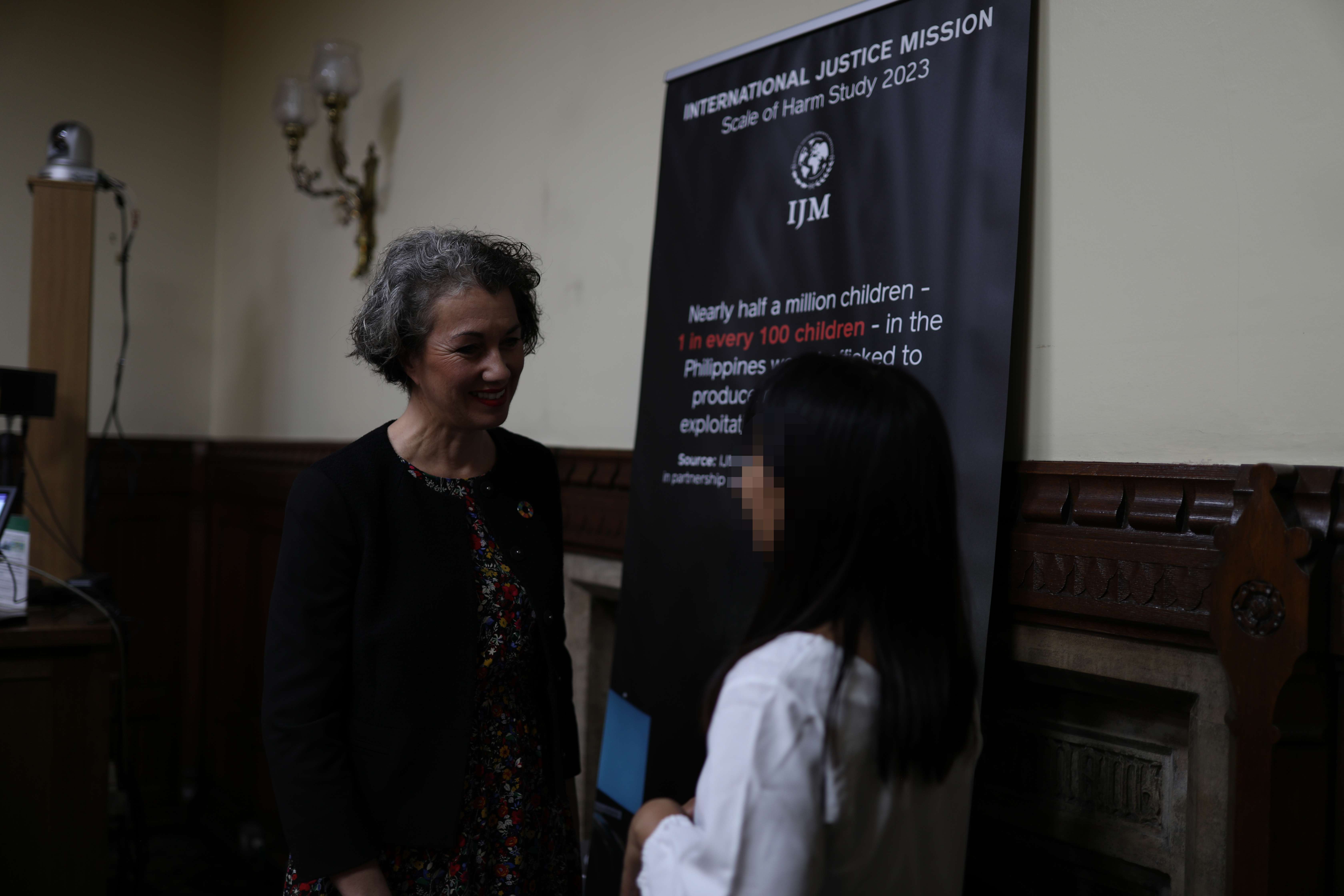 Cassie speaking with Sarah Champion MP. Cassie’s face was blurred to protect her identity.
Cassie speaking with Sarah Champion MP. Cassie’s face was blurred to protect her identity.
*Pseudonym used to protect survivor
*Photo credit: All photos in this article were taken by IJM UK.
